
AIChE’s Award for Service to Society recognizes outstanding contributions by a chemical engineer to community service and to the solution of societal problems. The honoree’s contributions emphasize a concern for the common good, a willingness to give time and comfort, and the ability to draw together varied resources to solve problems.
This year, AIChE presents its Service to Society Award to Dr. Christopher J. Pope, an independent chemical engineering researcher and consultant located in Santa Cruz, California. Pope is being recognized for creating a vision and leading a plan on how AIChE can be a welcoming and supportive organization for chemical engineering professionals with disabilities.
Dr. Pope and the other Institute and Board of Directors’ Award honorees will receive their prizes at the 2022 AIChE Annual Meeting, November 13–18 in Phoenix, Arizona.
Over the past decade, Pope has driven awareness of the disability community within AIChE. By creating programming, collaborating with other professional societies, and founding the Institute’s Disabilities Outreach and Inclusion Community (DORIC), he has helped AIChE to reveal commonalities and identify specific ways that the profession can support and mentor people with disabilities where they have been historically blocked from full participation.
“I have worked to encourage AIChE to address the many challenges — and recognize the unique abilities — of members of the profession with a disability.”
Chris Pope began his chemical engineering training at Princeton and Northeastern universities, and went on to earn his MS and PhD at MIT, where his doctoral research was on the chemistry of fullerene formation in flames. His current research focuses on energy and the environment, and he has documented his work in journal publications and dozens of technical conference presentations. Within AIChE, he has served on the Societal Impact Operating Council; the Equity, Diversity, and Inclusion (EDI) Task Force; and in the Climate Solutions Community.
Discussing his own experience with a disability, Pope begins by noting that the aphorism “ ‘Anyone can become disabled at any time’ really is more than a catchy saying. It is all too true.”
After being struck by Lyme Disease, Pope took courses to re-train his brain. The experience, says Pope, “was also a master class in equity, diversity, and inclusion, which has served me well in my EDI work with AIChE and elsewhere.”
Since becoming a participant at AIChE’s Annual Meetings, Pope says, “I have worked to encourage AIChE to address the many challenges —and recognize the unique abilities —of members of the profession with a disability.”
In 2013, Pope began programmed Annual Meeting sessions for chemical engineers with disabilities. He recruiting panels of professionals who had experience with disabilities, both within and outside of the chemical sciences. The resulting discussions — which included input from allies — added greatly to AIChE’s understanding of its stakeholders with disabilities.
“Having a history of service to communities that needed support,” says Pope, “I knew that I was not the only one who would benefit from an increased awareness of those of us with disabilities, as well as an appreciation of the unique talents we’ve acquired from surviving and adapting to those life challenges. So, my efforts were out of a spirit of service and of creating community — and of creating a change of consciousness within AIChE and the chemical engineering profession which would enable somebody like me to be hired.”
Through Pope’s efforts, AIChE formally established its Disabilities Outreach and Inclusion Community (DORIC) in 2019. “Working on what became DORIC also presented me with opportunities for service to AIChE and to the profession,” adds Pope. He notes, for example, that as a member of the Societal Impact Operating Council, he took part in updating AIChE’s statement on Equity, Diversity, and Inclusion — and today, as a member of AIChE’s EDI Task Force, he is helping to extend the Institute’s IDEAL (inclusion, diversity, equity, anti-racism, learning) vision into all sectors of AIChE.
Pope points out that while progressive change in areas addressed by IDEAL is underway, real progress requires a willingness to hear about the problems — a challenge that has not been completely overcome. As with dealing with a disability, “Individual recovery, to the extent possible, is not solely contingent on application of willpower, but on having or finding the resources needed, as well as confronting mindsets based on ignorance or prejudice,” says Pope. “Our profession itself needs to recover in its own way.”
Progress on disability initiatives has required persistence, adds Pope, who notes that one challenge has been to find people with disabilities — visible or invisible — who are willing to step forward. “As professionals, anything which suggests that one might be less than preternaturally over-productive can gravely limit opportunities for employment or advancement,” Pope says.
As long as more progress is needed for the benefit of underrepresented and underserved members of the engineering community, Chris Pope intends to continue his advocacy. But, he emphasizes, there is a strong need for more AIChE members to become involved. “Connections with people can make all the difference in the world,” says Pope. “My long-standing interest in the social sciences inspired me to improve my cultural competency. Likewise, the chemical engineering profession needs to cooperate with the most honorable people and institutions in our world to change the course of civilization for the better. We must. Now.”
This fall, ChEnected is presenting a series of profiles of all the 2022 Institute and Board of Directors’ Award recipients. Visit ChEnected regularly to meet this year’s honorees.
If you are interested in learning more about professional development, networking, and interviewing, be sure to check AIChE Career DiscoveryTM, which is part of the Institute for Learning & Innovation (ILI). See upcoming instances of the Career Discovery Workshop on AIChE Academy and read more about the process here.
Learn more about professional development


